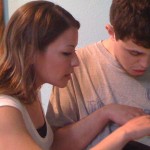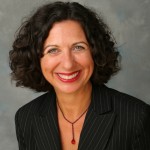Contributed by Kim Davis from the Indiana Institute on Disability and Community
When a student is in school, academics are the main focus. However, one aspect of learning that is not given enough emphasis is community building and developing relationships/friendships; the social aspect of education. Social goals and building friendships are mentioned in school conferences but are seldom fully explored and many times a student’s support team thinks academic success is the key to future accomplishments in secondary education and employment as well as helping to provide for a rich social life. This idea needs rethinking.
Social development implies that more than one person is involved, and that there are interactions with others and that there is participation in an activity. We are all social beings and need interaction to continually learn and develop. In schools, the word “social” is often found in the Individualized Education Program (IEP) annual goals:
Main Goal: Johnny will improve his social skills
Obj. 1: He will say please and thank you,
Obj 2: He will sit with a peer to play a game for 20 minutes, and
Obj 3: He will cover his mouth if he coughs.
Those are useful social skills, but are they the only type of goals that should be written in an IEP? There are other opportunities in school for true ‘social’ situations. Surely, if one thinks hard enough, other options can be discovered.
There are many opportunities for social interactions at school that are often overlooked due to limited time and the focus on keeping things moving. However, with some planning these opportunities can become excellent chances to develop and enhance social exchanges. It is important to think creatively in order to build in new chances for relationships to develop. Elementary, middle, and high school offers chances for building social networks, friendships and communities. At the secondary grade levels, there are more varied options offered by the school. At the each level, an adult, acting as a facilitator, may be necessary to get the relationship going or to offer ongoing support. Consider the following options as places that a student on the autism spectrum and his/her peers can begin to develop meaningful relationships. Remember, every relationship starts slowly and then grows as people get to know one another. What everyone needs is the opportunity. Here are some ideas to consider:
Getting on and off the bus:
Instead of a parent driving a student to school, have the student ride the bus or even carpool with a neighbor or classmate. If they have to wait, a peer or peers could wait in line for the bus along with the student with ASD.
Before school:
The student should be where other students are in order to participate with them; such as hanging out with peers in the gym, cafeteria or hall instead of simply going to the classroom.
In the halls:
A peer buddy could walk with the student with ASD to the next class or to the library, gym or cafeteria. Sometimes the student might need to leave early to avoid hallway congestion which could cause sensory challenges.
Before class starts:
Peers could assist the student in prepping for class or simply chat until class begins, just like other students do.
Class breaks:
Going to the restroom, getting a drink or simply having some down time in class could all be supported by peers.
Group activities in class:
Anytime there are group activities be sure the student with ASD is included in a group that has peers who know him or her, and understand the strengths and gifts of that student.
Lunch:
Include the students with ASD with everyone else and use peer support instead of having them sitting alone or at the special education table.
Recess:
This time has been described by one boy with ASD as his “personal hell” due to bullying, not knowing what to do, or no one interacting with him. This is the perfect time to have peers interact and support the student with ASD. They can rotate around by doing a different activity of interest with the student or introducing a new activity.
After school activities: These will be different for each level. Elementary activities may be after school day care or extended day programs. These certainly offer opportunities for student on the spectrum to play with their peers. Other events tend to be done in the evening for the family.
Middle and high school offers a variety of activities that are immediately after school such as clubs, music, or sports events.
Music: Many schools have a music program at holiday time. Students should have the chance to participate in those singing and musical events so their families can know that joy. Perhaps they do not sing every number but instead ring a bell, tap a drum, or hold a prop. The student should be there as much as possible.
At the middle and high school level there are more musical options that become available. Learning to play an instrument and joining band begins in middle school. This can lead to other opportunities such as a concert band, marching band, jazz band or pep band for sporting events. There are also drum line groups. Orchestras would play concerts and also for musical plays.
One does not need to play an instrument to enjoy music. Middle and high schools also have choirs and choral groups that sing at school events and also compete.
Finally, if a student really enjoys music there is always the need for band boosters who provide support to the various music activities at schools.
Drama: A theatre program may be available at middle school but for sure is available at the high school level. There are different parts of putting on a play that a student may enjoy besides being an actor with a role. The other aspects include: creating the set, managing the sound, adjusting the lighting, setting up and moving set props, cueing the actors, and the designing and creating of the costumes. Each aspect involves a different skill and may tap the interests of the student with autism.
Clubs/Organizations: Schools have an abundance of extra- curricular organizations that could be fun for any individual with ASD based on his/her interests. The huge interest in certain books or movies often creates a place to begin exploring ideas.
Here is a sample listing:
Art Club
Best Buddies
Book Club
Chess Club
Brain Game/Quiz Bowl
Digital Arts Society
Foreign Language Club
Environmental Club
Habitat for Humanity Group
Year Book
Newspaper
Ping Pong Club
Poetry Club
Science Olympiad
Spell Bowl
Student Council
Swing Dance
Backpacking Club
Black Culture
Diversity Club
Ham Radio Club
Gothic Club
Photography Club
Ski Club
Speech and Debate
SADD
Computer Games Club
Yearbook
Once again, the interest area of the student should drive the club or organization that he joins. Each club meets on a regular basis and that increases the chance for developing meaningful relationships.
Sports: Finally, there are athletic events at both middle and high school levels. Both boys and girls athletics offer a wide variety of opportunities for interactions from participating on a team to being a member in some other fashion. Options include: managers, scorekeepers, time keepers, equipment caretakers, equipment room managers and a batboy or girl.
Here is a potential list of teams to consider. Each offers different opportunities for participation.
Baseball
Basketball
Football
Volleyball
Golf
Tennis
Softball
Soccer
Track
Swimming
Cross Country
Wrestling
Of course with athletics comes cheerleading, or pom squad opportunities. These groups are also a big part of middle and high school. Here someone could participate in cheering but also in creating posters or signs for the school, making announcements, posting announcements or posters or creating any other team spirit materials.
Truly, some of these options may be more challenging than others when it comes to creating meaningful social interactions. But it is worth looking at them all, even small and successful interactions can eventually grow into true friendships. Everything can start small and build from there. Consider the use of peers in each situation to simply begin the process of relationship building and helping your students with building a community based on interests and skills. Their life and the lives of his peers will be greatly enriched.
Davis, K. (2010). Finding a Friend in School. The Reporter, 15(4). Retrieved from http://www.iidc.indiana.edu/index.php!pageID=3280


